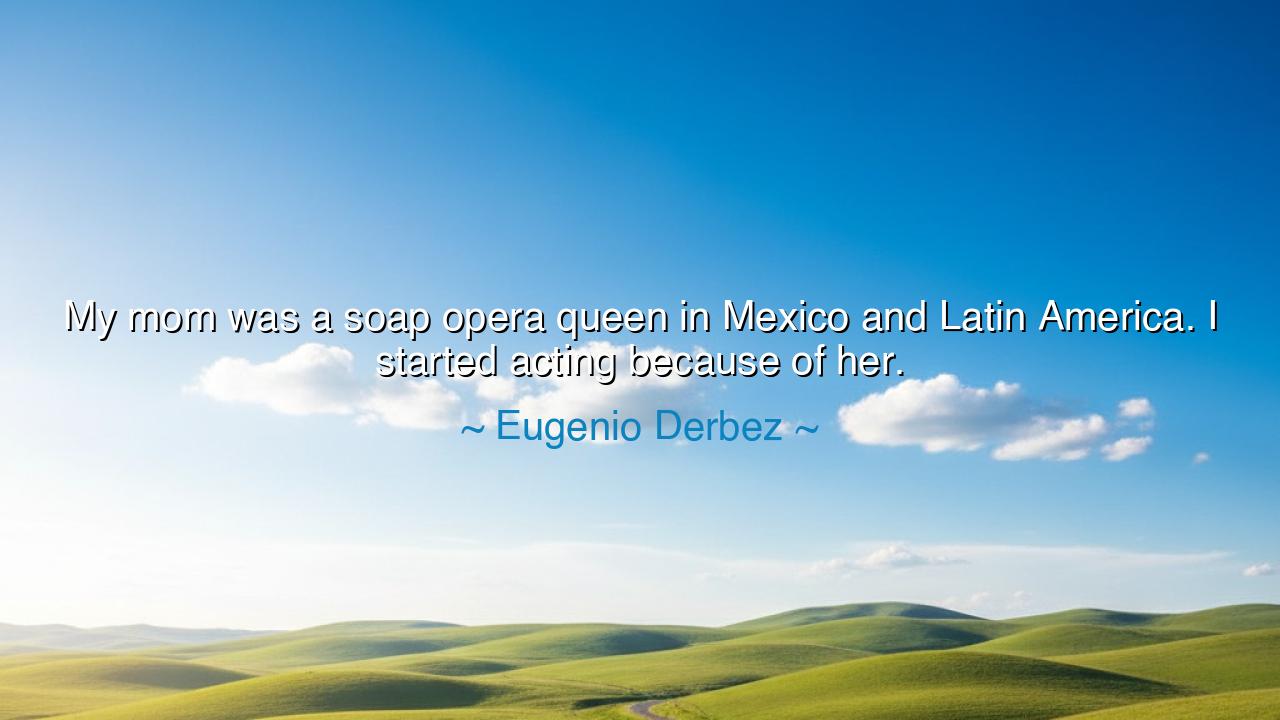
My mom was a soap opera queen in Mexico and Latin America. I
My mom was a soap opera queen in Mexico and Latin America. I started acting because of her.






Hear the words of Eugenio Derbez, who spoke with reverence and remembrance: “My mom was a soap opera queen in Mexico and Latin America. I started acting because of her.” Though simple in tone, these words resound with the eternal song of inheritance—the truth that our beginnings are often shaped by those who walked before us. For in his confession, Derbez acknowledges the living thread between mother and child, between the stage of one generation and the stage of the next.
This utterance is born of lineage. His mother, a queen of the stage, embodied art not as mere performance but as a calling, a destiny she carried before the eyes of millions. In the brilliance of her craft, young Eugenio found both shadow and light: the shadow of expectation, the light of inspiration. Thus, his path was not chosen in isolation; it was carved by the presence of one who had already conquered the realm of performance. This is the power of example—what the parent lives, the child often breathes.
The ancients knew this well. In Greece, the sons of warriors often became warriors themselves, not by decree but by the echo of their fathers’ deeds. In Rome, the children of senators often carried the mantle of governance. And in the East, the disciples of masters often bore forward their teachings into the future. So too with Derbez: the art of acting, which he made his own, was first planted in him through the soil of his mother’s triumphs. Thus, he reveals the timeless truth that greatness is often born from proximity to greatness.
Yet within this origin lies not only inheritance but also choice. For though Derbez was inspired by his mother, it was he who embraced the stage, who gave himself to the labor of performance. The gift of inspiration can be given, but the path must still be walked. Here lies the noble tension between destiny and will: we are shaped by those before us, but we must still take the step ourselves. Without his own courage, Eugenio’s story would have ended as mere admiration, not legacy.
Let us recall the story of Sophocles, whose father was a simple armorer. From the sound of the forge came not art but strength. Yet from that beginning, Sophocles rose to become one of the greatest tragedians of Greece. His father gave him no stage, but he gave him discipline. So too does Derbez’s story show us that whatever we inherit—be it crown or labor—it must be shaped by our own hands. A parent may be a queen of the stage, but the child must find his own voice upon it.
The lesson here is twofold. First, honor your roots, for they are the soil in which you were planted. Even if they do not define you, they have shaped you. Second, claim your path with courage, for inspiration alone is not enough. Greatness cannot be borrowed; it must be forged. Derbez teaches us that we may begin by looking up to another, but we must rise to stand beside them with our own merit.
Practical wisdom follows: if you have been blessed with a model of excellence, honor them by cultivating your own craft. Do not shrink from their greatness, but let it ignite you. And if you have not been given such a model, then seek inspiration in the lives of those who came before—heroes, artists, thinkers—until you, too, become a beacon for those who follow. In this way, the chain of inspiration continues unbroken.
Thus, let Eugenio Derbez’s words endure as a torch: his mom, a queen, lit the flame, but he carried it forward. And so it is with us all: we inherit sparks, whether of art, of wisdom, or of sacrifice, and it is our sacred duty to fan them into fire. For in doing so, we do not merely honor our past—we shape the destiny of generations yet to come.






AAdministratorAdministrator
Welcome, honored guests. Please leave a comment, we will respond soon